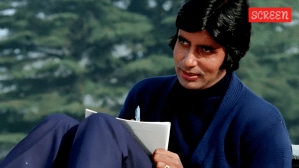Filling the party kitty, with guilt
The newspapers tell us that Congress Party president Sonia Gandhi presented Rs one lakh each to the five Dalits killed in Jhajjar in Haryana...

The newspapers tell us that Congress Party president Sonia Gandhi presented Rs one lakh each to the five Dalits killed in Jhajjar in Haryana; and that Ajit Jogi, the Chief Minister of Chhattisgarh, brought back 90 gifts from Singapore for all the Members of the Legislative Assembly in his state. The question comes to mind is: where does the money comes from, since fund collection is a major problem for parties with a conscience.
Dr Manmohan Singh was recently asked to find a way of solving the funds crunch within the Congress Party. Parties or individuals who can afford such generosity would be the envy of others. All-party meetings on electoral reforms, which include a discussion on state funding for elections, have meandered on without reaching anywhere. Either there are too many crisis-ridden events that take up the attention of parties both inside and outside the Government or everyone is quite happy with the way things are.
But election funding is only one part of the story. The real Pandora’s box is the nature of fund collection that all parties face, whether in power or out of it. It seems that no one wants to discuss it because the real questions on probity, party membership, democratic functioning and the spread of black money through the veins of India’s corporate sector and in governance are awkward unmentionables for everyone concerned. We need to step beyond the tired cliches of ‘‘the politician-bureaucrat-corporate nexus’’ and rework our laws and understanding of what is really right and wrong in the methodology of fund collection in parties for their routine party work, not including elections.
|
The sensationalising of all politicians as crooks dealing in ‘black money’ doesn’t account for the fact that a party is well within the law in accepting cash. And it is more convenient to receive donations in cash since legitimate expenditures, if not personal use, are nearly always for urgent need |
The Income Tax Act states that political parties can acquire their funds through three means: from the rents or incomes from property, from the interest on fixed deposits, and from voluntary donations from the public. Only rich parties can hope to have properties of their own. The same applies to fixed deposits, which have to be worth crores to give incomes of lakhs to fund party offices, campaigns and conferences.
The travel expenses of party leaders alone, particularly when they want to match government ministers who have the use of helicopters and cavalcades, is a huge cash gobbler which parties seeking funds purely through public donations could never afford.
An important fact concerning the receipt of voluntary donations from the public is that the money does not have to be paid by cheque. It is only when filing income tax returns that the party must provide the name and address of every donor giving above RS 10,000.
The sensationalising and cartooning of all politicians as being crooks who deal in ‘‘cash’’, aka ‘‘black money’’, do not take two important factors into account: A party is well within the law in accepting cash. It only has to tell the tax collectors who gave it to them. Secondly, politicians and parties find it far more convenient to receive donations in cash since expenditures, if legitimate and not meant for personal use, are nearly always for an immediate and urgent need.
For instance, the rental advance for the use of a hall or a maidan, the pandalwala or the caterers, the hiring of taxis, autorickshaws all need payments in cash. The rigmarole of depositing a donation and taking the money out again is a process that enthusiastic party workers who make the arrangements find impractical.
Parties that emerge out of struggles, which is generally the case in India, do not function with the mindsets of chartered accountants, but view the acceptance of Rs 5,000 from a well-wisher to pay the printer of leaflets a perfectly legitimate activity even if it is not done through banking procedures. It takes a while for parties to keep administrative records on par with its political work. It also needs qualified people, who do not come for free. Often these records are cosmetic.
The crucial factor in the giving and accepting of a donation, irrespective of is size, is the reality that a party should have no problem at all in giving the identity of the donor. It is always the donor who wants anonymity. This is for two reasons. The first is because he is scared of being the victim of a vengeful ruling party that opposes the party he supports, and more importantly, the money given is nearly always black money, wherein the donor shuns scrutiny and accountability.
For parties, all money is white, non-taxable money, whether cash or cheque, as long as it is accounted for and spent legitimately. The real villain is the tax-evading donor, but the cartoon hate figure is always the politician.This is not to say that all politicians do not work hand-in-glove with people who amass illegal wealth, just as there are honest donors who are willing to stand up and be counted. The reality also is that donors can seldom afford more than ten thousand rupees by cheque in the first place and that all donations are not about bribery and corruption.
|
Political party membership fees as a source of funds have been a joke for a long time. Aspiring leaders fill up forms in the names of bogus members and pay the fees in order to show their ‘‘influence’’. No party can cover even a month’s expenses from funds generated from genuine membership |
Party membership fees as a source of funds have been a joke for a long time. Aspiring leaders fill up forms in the names of bogus members and pay the fees in order to show their ‘‘influence’’. No party can cover even a month’s expenses from funds generated from genuine membership.
The increasingly undemocratic functioning of parties is another problem. For instance Uttar Pradesh Chief Minister Mayawati makes no bones about publicly admitting that she gets huge donations on her birthday, that she takes lakhs from each person who is given an election ticket. Most party chiefs prefer to exercise total control over ‘‘loyalists’’ by keeping total control of the funds. Parties that flood the town with buntings and posters for their events are supposed to be electorally stronger, but it only means that they have more access to dubious funding.
A chief minister of any party is expected to fill the central party coffers. This implies that he or she is expected to do favours in return for cash. Some recycle state government funds into the hands of party supporters who give ‘‘donations’’ to the party, which sends it to the ‘‘high command’’. Every ruling party that comes to power blatantly does this while the honest politicians who steadfastly refuse to tread this path get no kudos from within the party. All this happens because grass-root work and genuine decentralised fund collection are almost forgotten. Unless this morally hypocritical and fiscally dishonest system is addressed democratic politics will be a sham and the really corrupt characters will laugh all the way to their Swiss banks.
(The writer is a Samata Party leader)



- 01
- 02
- 03
- 04
- 05



























